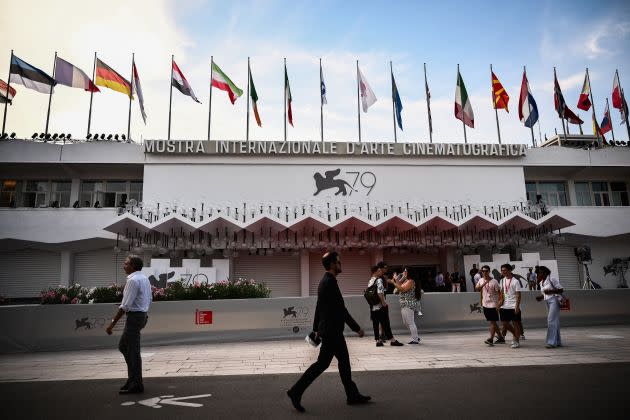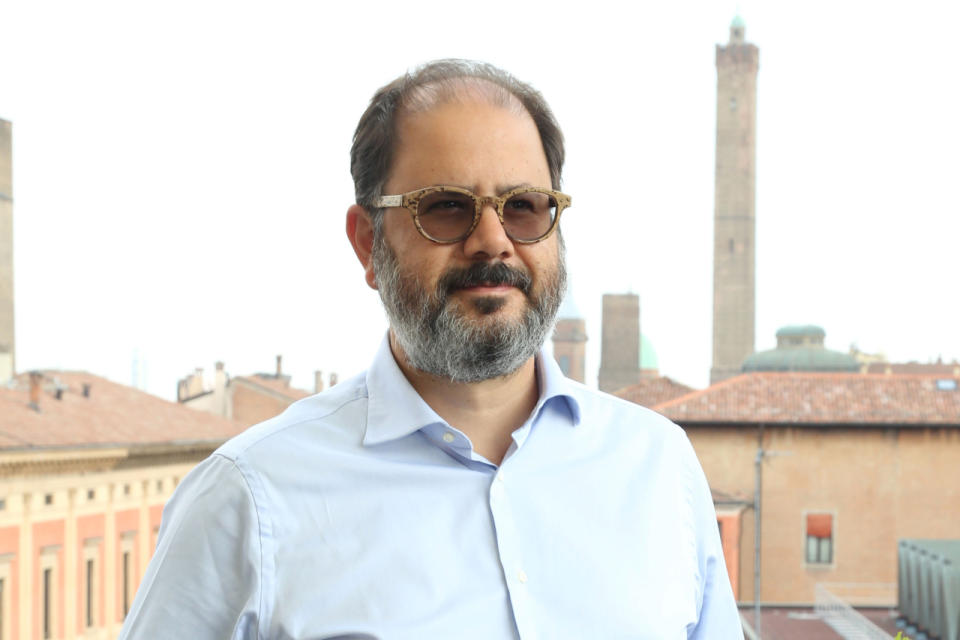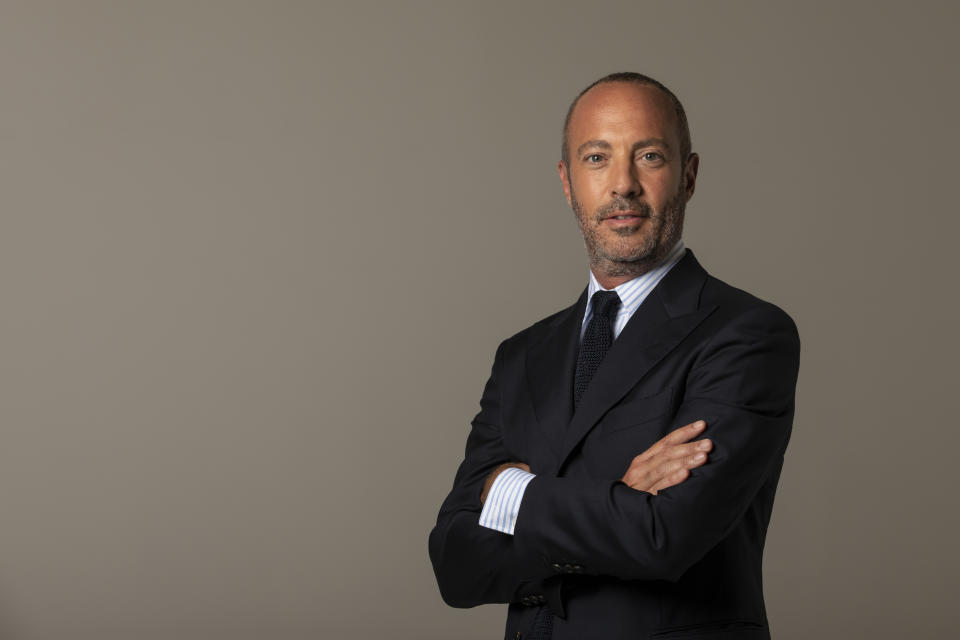“The Industry Is In A Period Of Change”: As Venice Kicks Off, Leading Italian Execs From Cinecittà To True Colours Dissect The Biz

There’s an air of positivity among Italian film professionals as they head to the Venice Film Festival this year, in spite of the country’s depressed theatrical box office in the wake of Covid and a looming cost of living crisis across Europe.
The optimistic mood is driven in large part by recent state-backed support for the country’s audiovisual sector, which is increasingly regarded as a pole for future economic growth and employment
More from Deadline
Under the country’s post-pandemic economic recovery plan, put in place by the former unity government of Mario Draghi, $300m has been set aside for investment in the sector for the period running 2021 to 2026.
Following the fall of Draghi’s government over the summer, a general election will take place on September 25. Whatever the outcome, the potential successors are being urged to maintain the recovery plan and cinema spending is not expected to be impacted.
The country’s 40% tax credit for production as well as increased investment obligations for the global platforms are also helping to drive a local production boom, which resulted in more than 250 local features being completed over the past year.
Against this backdrop, Deadline touched base with a handful of local film execs for their views on the current state of play.
Andrea Romeo, CEO & Founder I Wonder Pictures
Bologna-based distribution company I Wonder Pictures is handling the Italian releases of 10 Venice 2022 selections, including Golden Lion contenders The Whale and Monica, Horizons selection La Syndicaliste, Horizons Extra titles The Origin Of Evil and Amanda and Giornate degli Autori opener March On Rome.

I Wonder Pictures
What are the biggest challenges facing your company and the distribution sector?
Redefining our relationship with the public to build new audiences.
Where do you see opportunities?
In a more targeted approach. I Wonder Pictures has recently launched four new distribution line-ups: I Wonder Animation, focused on younger audiences and featuring titles like Le Petit Nicolas and the new Ernest and Celestine; I Wonder Arthouse, I Wonder Classics and a central line-up aimed at more mainstream quality indie titles such as Everything Everywhere All at Once, The Whale, The Origin Of Evil and Amanda. We’ve essentially split our line-up into four, enabling us to increase the number of releases across the different strands to connect with different audiences.
How has 2022 been in terms of business, and what are your hopes for 2023?
We expect to see growth in the coming months. For the period running January 1 to August 15, we ranked 11th in the distributors’ table. All the companies ranking higher than us saw drops in their box office of between 30 to 60% by comparison with the same period in 2019, I Wonder Pictures, on the other hand, registered a drop of just 3.4%.
We’re happy to be kicking off our autumn schedule with Everything Everywhere All at Once (which releases in Italy on October 6) following its success in the U.S., where it appealed both to younger audiences and older cinemagoers. We’re trying to bring this phenomenon to Italy.
We also believe in Amanda starring Benedetta Porcaroli (October 13). This was our first collaboration with French sales agent Charades under the projects pact we announced last Venice. We’ve accompanied this project together, building an identity for the film at home and internationally and are pleased to see it premiere in Horizons Extra. From October through to the end of March, we have an intense release schedule, with a new film coming out every week across the four line-ups.
Venice artistic director Alberto Barbera suggested in an interview with Deadline in July that too many Italian films were made over the past year, saying it was neither “useful” nor “helpful”. Do you agree?
Alberto Barbera is the head of the Venice International Film Festival so his point of view should be taken into consideration.
But while the Italian cinema sector needs to pay attention to quality we also need to take into account that the Italian film industry is in a period of change right now, thanks to increasing amounts of investment and support from the Directorate-General for Cinema and Audiovisual of the Ministry of Culture.
We’re moving away from an artisanal approach to an industrial one. Italy is already very strong on auteurs. What we’re seeing now is the development of a more commercial and mid-range sector. This will take time to build but in the process, know-how and the quality of productions will rise. We’ve seen the same move in France, 15 years ago and it took time to trickle through there too. This increase in production and investment is a tremendous opportunity for Italian companies.
Nicola Maccanico, CEO Cinecittà SpA

Cinecitta
Cinecittà SpA is out in force at Venice, overseeing the Italian Pavilion and a series of talks and panels focused on the Italian film industry from September 1 to 6.
What are the biggest challenges facing Cinecittà right now?
The objectives for Cinecittà SpA under its new Industrial Plan, between now and 2026, are to restore Cinecittà to the height of its worldwide fame. Until recently, it was a place people came to experience the history of cinema, but rarely to shoot a movie.
Our goal is to return Cinecittà to being the ideal place to make a film, series, or documentary for all Italian and international productions. We want to be a leading European player and to welcome the best stories from all over the world.
Where do you see opportunities?
This great moment in the production and creative world; the government’s ambitious post-pandemic recovery plan, the exceptional global demand for audiovisual content, as well as our advantageous tax credit covering up to 40% of eligible expenses.
These elements accompany our expansion plan, involving new and larger studios, an extension project for outdoor sets, and the opening of new innovative spaces such as the largest LED wall in Europe. We are doubling the production capacity of Cinecittà, which will allow us to welcome ever larger and more ambitious productions.
What are your aims in 2022 in terms of business, and what are your hopes for 2023?
In 2022, to bring the financial statements of Cinecittà SpA. into profit. and in 2023, to further improve the result.
Do you agree with Barbera’s suggestion that too many Italian films are being made?
Quantity also means variety, eclecticism, and an articulated production system. However, it is necessary to make even more solid and ambitious films that can travel beyond our borders more than they currently do. Our cinema has masters, incredible talents, and world-class professionals in all departments. It’s time to take it one step further, make bigger films, looking for a global audience. This is the type of cinema that Cinecittà wants to welcome and we know that the creative energies to do so today exist in Italy.
Gaetano Maiorino, managing director & head of acquisitions, True Colours Glorious Films
Rome-based sales company True Colours is handling four Venice features: Horizons titles Princess and Burning Hearts, Horizons Extra film Hanging Gardens, and Giornate degli Autori selection The Bone Breakers.

True Colours
What are the biggest challenges facing your company and sector right now?
A shift in the market has completely changed the landscape of international sales and increased the financial risks. True Colours has responded by focusing on high-profile titles and increasing the number of non-Italian language films to widen the network of distributors we work with.
This strategy is paying off. We’ve done good business on all the films we presented at the Marché du Film in Cannes, driven by competition title Nostalgia, and also Delta, The First Day of My Life, which is still in post-production and pre-sold in several territories already, the Dutch film El Houb and the Spanish-Argentinian co-production Empieza el Baile.
The scouting of new titles has become even more important than before and with all the product now on the market, it is not easy to stand out.
In terms of the Italian films on your slate what are the main opportunities right now?
Italian films still charm foreign buyers, but the theatrical market has shrunk everywhere so the space for Italian titles is smaller than before. Quality films will always find a place and director-driven titles which secure a slot in one of the main festivals still travel within the niche of arthouse distribution, but revenues are lower than in the past.
The Italian government, with the help of the sales agent association and [cinema industry body] ANICA, has developed a good distribution fund which supports the release of Italian films abroad.
This has had a positive impact on the circulation of Italian movies in recent years. There is still room for improvement, but the institutions and the industry have built a better dialogue recently, so I’m confident we are on the right path.
Increasing the number of international co-productions is another good way to develop the circulation of Italian films. The new minority co-production fund created by the Italian government is helping to create new opportunities for international partnerships.
How has 2022 been in terms of business, and what are your hopes for 2023?
After quite a tough 2020 and 2021, we started to see a positive trend in the first semester of 2022. The volume of business is still far from 2019 levels, but there is increasing demand for new titles to exploit in cinemas. We are confident that it will continue to grow in the second half of the year and in 2023 but returning to the same results of the past will be a slow process.
Do you agree with Barbera’s suggestion that too many Italian films are being made?
There are too many expectations on some of these projects. Films that perform well on a national level, don’t automatically become exploitable for foreign sales as they can be too local. There is nothing wrong with that. There is nothing bad in producing films aimed at the local market only, it’s just a matter of better assessing the potential of these films; not all of them are meant for A-list festivals or for international circulation.

Mauro Vento
Daniele Orazi, CEO, talent agent, Do Cinema
Venice 2022-bound talents on the books of Rome-based agency Do Cinema include Monica Bellucci (Dry), Stefania Sandrelli (Acqua e Anice), Alba Rohrwacher (March On Rome) and director Fulvio Risulio (Ghost Night). The company will also promote a raft of young talents scouted nationwide through its We DO powered by DO Cinema initiative
What are the biggest challenges facing your company and sector right now in Italy?
The big challenge is creating a real Italian star system but beyond that, there are a series of further challenges, mainly related to the recognition and professionalization of our profession.
Along with other colleagues in the sector, I was recently involved in the recent creation of the association, Agenti Spettacolo Associati, representing talent agents active on a number of fronts.
An important next step would be the legal recognition of our profession with a register and related training and qualifications.
This could be the right moment for such a milestone thanks to the recent series Call My Agent, which is currently getting an Italian remake and could finally present our profession in a positive light to the Italian public.
Another major challenge is keeping up with technology which has completely changed the casting and promotional process.
What are the main opportunities for Italian talents right now?
Being able to compete in other markets. Thanks to the use of self-tapes but also the acceptance of new aesthetic canons, more and more Italian talents are participating in international castings.
Opportunities are also increasing due to the rising number of foreign productions using Italy as their principal shooting location.
How has 2022 been in terms of business, and what are your hopes for 2023?
So far, this year has been very positive. We’re not at the end of the year, but the accounts department has already calculated an increase in turnover, with the difference from last year earmarked for internal investment.
Looking to 2023, my aim is always to increase turnover by at least 20% every year, so I can raise the bar in terms of investments and training more collaborators, a goal which so far, I have always achieved.
Do you agree with Barbera that too many Italian features are being made?
Making too many films is a phenomenon that has always existed in our country for various reasons. I agree with Alberto that in recent months this phenomenon of excessive production has been accentuated. There are two main reasons for this: the welcome tax breaks and the demand for content from the platforms.
These developments are a boon for our profession but quality suffers due to the resulting “instant movies”. Italy wasn’t perhaps ready for the uptick in demand, just think of the current difficulty in finding the workers on the sets, but I am confident that our artists, after an initial period of adjustment, will focus more and more energy and resources on great cinematographic works that have always distinguished us as protagonists on the world scene.
Catia Rossi, Managing Director, Vision Distribution

Vision Distribution
Rome-based Italian content-focused sales and distribution company is handling sales on Paolo Virzì’s Out Of Competition title Dry and Horizons selection Ghost Night by Fulvio Risulio and will distribute Luca Guadagnino’s Golden Lion contender Bones And All in Italy.
What are the biggest challenges facing your company and sector right now?
They are the same as those facing the entire European film Industry, namely the difficulty in finding visibility outside the country of origin. In general, European quality cinema needs a capillary promotion starting from festivals and support for the arthouse domestic distributors who are currently suffering due to the pandemic. Italian Cinema traditionally struggles because it is in the Italian language and also due to the lack of a proper star system which can grant saleability of the film based on the cast.
Can you see any opportunities?
The opportunities I see are essentially based on increasing the quality of the films. Audiences need to feel the film is worthy of the theatrical experience. Coming back to the necessity of supporting arthouse distributors – the Italian Ministry of Culture’s support for distributors, which has recently been renewed, has also aided the export of Italian cinema.
What’s your verdict on 2022 so far for the industry, and what are your hopes for 2023?
Our 2022 has been quite positive so far especially thanks to The Eight Mountains by Felix van Groeningen and Charlotte Vandermeersch, which was selected in Official Competition in Cannes and awarded the Jury Prize. The film has been sold widely during Cannes. We can also rely on strong films for the second part of the year with the new films by Paolo Virzì, Gianni Zanasi and Donato Carrisi.
I am optimistic for 2023 as I strongly believe the theatrical market will have a strong recovery after the pandemic.
Do you agree with Barbera’s suggestion that too many Italian features came to fruition this year?
As I said before, I believe we need to focus on the strongest projects which can have a proper theatrical distribution and these are the ones that can potentially travel internationally so I basically agree with Barbera.
Alessandro Amato & Luigi Chimienti, co-heads Dispàrte
Producers Alessandro Amato and Luigi Chimienti make their Venice feature debut with Niccolò Falsetti’s Critics’ Week title Margini, about a Tuscan punk rock band determined to break out beyond their provincial port town.

Disparte
What are the biggest challenges facing your company and sector right now?
Alessandro Amato: Establishing our company and breaking into a system which is not always meritocratic, to secure funding finance and support for our projects.
Luigi Chimienti: Finding and developing movie projects that stand out, that we want to see in cinemas, that anticipate audience tastes, and avoid formulas and patterns that don’t work anymore. Our way of producing relies on teamwork and we need to fall in love with a project.
The weak box office after the pandemic is also obviously a concern. We need to rebuild the relationship with the audience. We’re committed to the theatrical release of Margini and will be arranging a series of concerts and events with the cast and crew to attract audiences that have abandoned the cinemas.
What are the opportunities?
Amato: The government is investing a lot of money into cinema and the audiovisual sector right now. The new minority international co-production fund is a good opportunity for us. Our intention when we started the company was to work internationally. All our productions have been co-productions, which has helped us grow. The fund helps us with reciprocity and brings Italian producers to another level internationally.
What’s your verdict on 2022, and what are your hopes for 2023?
Luigi Chimienti: It’s hard to predict the future, especially after the last few years when things have changed very rapidly due to unexpected events like the pandemic and the war in Ukraine but we remain hopeful. The box office has been hit hard in Italy but over the summer, open-air cinemas were well attended, showing there is still interest in seeing movies as a community. My main hope is that over the second half of this year and into next year, cinema will reconnect with audiences in theatres.
Do you agree with Barbera that too many Italian features are being made?
Amato: Barbara is right when he says there are a lot of productions in Italy but it’s important to take a deeper look at the situation. Of course, quality is an important factor, but the volume of production is a sign of a sector that is in ferment. it’s a time of growth and experimentation. This is a natural consequence of the extra investment that has been put into the sector. The next step is to take more care with development which would raise the bar in terms of quality.
Best of Deadline
Venice Golden Lion Winners : Photos Of The Festival’s Top Films Through The Years
'Meet Cute' Photo Gallery: Kaley Cuoco And Pete Davidson Star In Comedy About Falling In Love
Sign up for Deadline's Newsletter. For the latest news, follow us on Facebook, Twitter, and Instagram.

